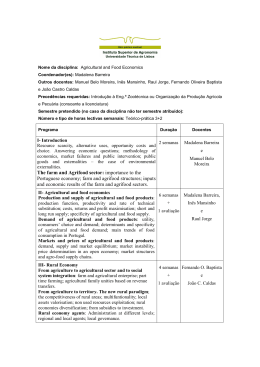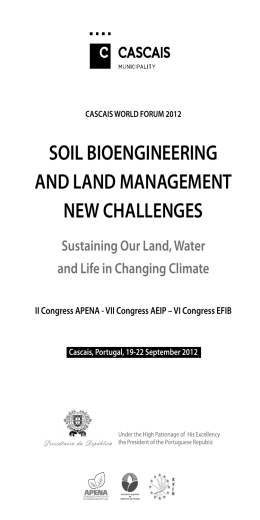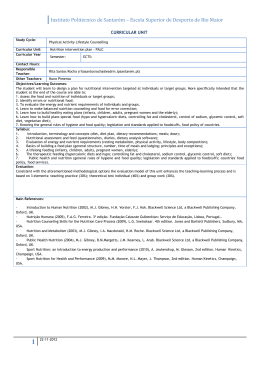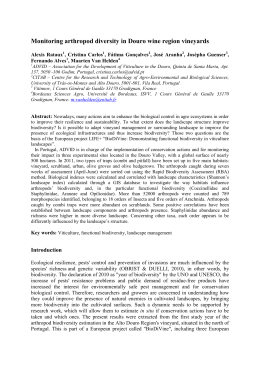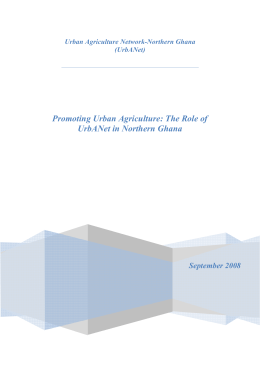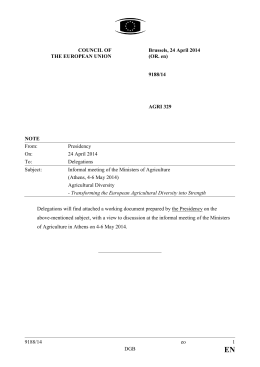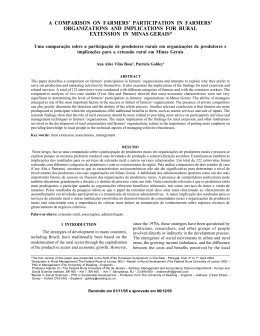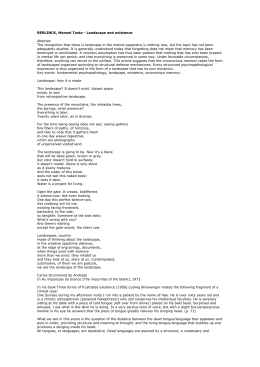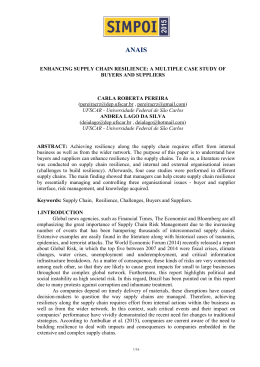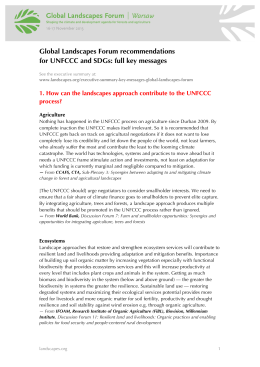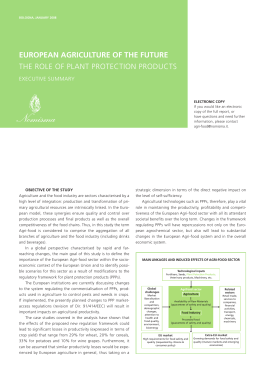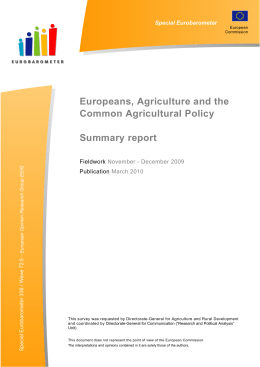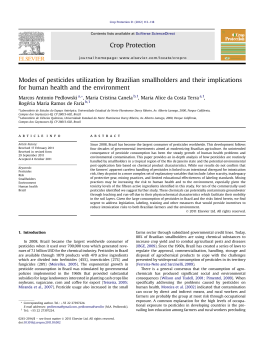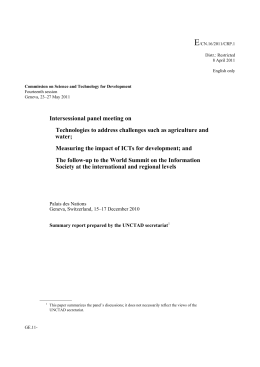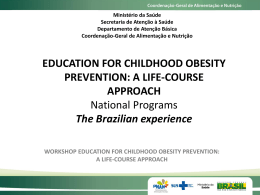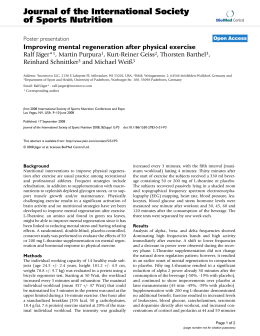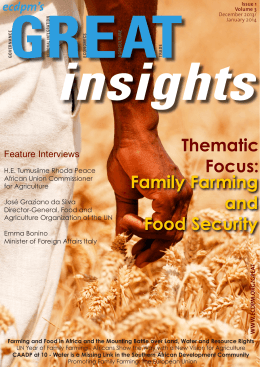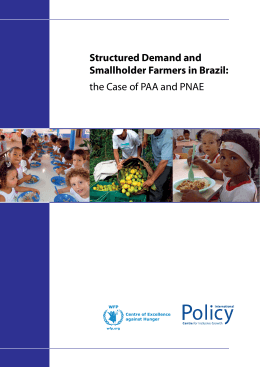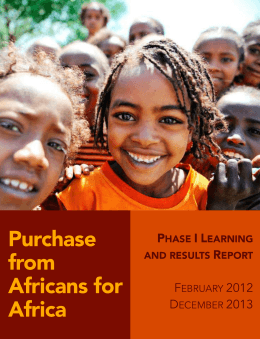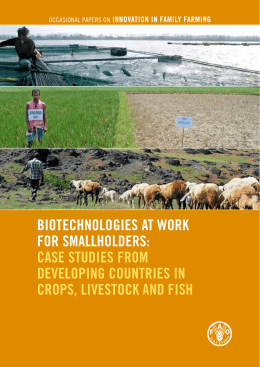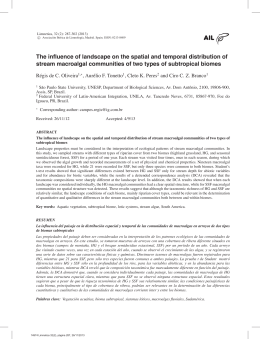SUMMARY REPORT OF THE FOOD SECURITY DIALOGUE DAY ORGANIZED BY FAO, IFAD, WFP AND BIOVERSITY INTERNATIONAL 19 June 2012 Rio de Janeiro, Brazil Enhancing food security will take both global vision and local action. Strategy and implementation must be linked in order to obtain the Rio vision of food security. The Food and Agriculture Organization of the United Nations, the International Fund for Agricultural Development, the Word Food Programme and Bioversity International engaged with stakeholders in a focused dialogue to identify pathways that lead to a food secure future. The main objectives of the event, held on the sidelines of the United Nations Conference on Sustainable Development - Rio+20, were to discuss about concrete actions for fighting hunger and malnutrition and strategies to reduce poverty and enhance the resilience and sustainability of production systems. Participants at the event affirmed that there cannot be sustainable development without bold actions to achieve food and nutrition security, and agriculture and food systems that lift smallholder farmers and vulnerable communities out of poverty and preserve the natural resource base. The top 5 recommendations made by speakers and participants in the event include:. 1) A comprehensive approach to sustainable development must entail coherent, future-oriented national policies, startegies and visions for food and nutrition security that are people centered, with a focus on poor smallholders and food insecure, vulnerable communities, women and youth. 2) Smallholder farmers must be supported to realize their full potential by enabling them to increase their agricultural productivity, promoting their access to markets and services, rewarding their efforts to preserve landscape and ecosystem services and strengthening their resilience to external shocks – particularly environmental and climate-related – through insurance and social protection. 3) A key and powerful pillar of sustainable development is the inclusion of vulnerable and food insecure people and communities into sustainable development processes through safety nets, critical to enhance their livelihoods, boost their food security and build resilience at a large scale as part of an integrated approach that connects food production, access to food, risk management and environmental sustainability. 4) Empowering women – economically, socially and politically – must be central to efforts to achieve food and nutrition security and the shift to sustainable agriculture and food systems. Agriculture must also be attractive to our youth and for future farmers. They will be innovators in new forms of agricultural production systems. 5) Working across levels, from community to global, we must develop new multisectoral approaches and multi-stakeholder platforms that help overcome structural barriers to transformational change in food and agriculture systems, move beyond old models and paradigms, strengthen collaborative decisionmaking and enable different stakeholders to resolve their diverse, and frequently conflicting, interests within an agreed common framework. The full list of 10 key recommendations can be found in the Annex. 1 | INTRODUCTION Representatives from governments, international organizations, the private sector, non-governmental organizations, philanthropic foundations, civil society, farmers and the scientific community, met at the Romebased Agencies full-day event on food security in Rio de Janeiro addressing the following main challenges. Zero hunger and ensuring access to nutritious food. Current pathways have left 1.4 billion people in extreme poverty, 925 million hungry and many more malnourished and food insecure. There can be no sustainable development without tackling hunger and if people have no protection from risks and shocks, and no hope to contribute to and benefit from growth, nor to fully enjoy their human development potential. Building resilience in view of growing uncertainty and risk. Increasingly uncertain climatic patterns and conditions, and high and volatile food and energy prices pose increasing shocks and stresses especially on the poorest people. Poor and marginalized communities in developing countries – both rural and urban - are typically most exposed to these risks, have the least adaptive capacity and are least able to deal with risks in the short and longer term. Balancing environmental sustainability and growth in agriculture. More food will need to be produced to meet the changing needs of a growing human world population – According to FAO estimates, a 60% increase in global production and 100% in developing countries is necessary by 2050. Yet the world’s natural resources are already under pressure, with loss of crop diversity, over-exploitation of fish stocks, deforestation, degradation, losses of arable land and aquatic ecosystems, and growing competition for increasingly scarce water and the impacts of climate change. The event, jointly organized by the four Rome-based Agencies FAO, IFAD, WFP and Bioversity International, provided a venue for a dialogue with key stakeholders from different levels and recommended concrete actions for a food secure future, specifically on the following topics: Strengthening the resilience of people and communities; Increasing incomes and access to nutritious food; Enhancing resilient and sustainable production and management of ecosystems; Reducing food losses and waste; Strengthening existing best practices, partnerships and innovation, at community/landscape, national/regional and global level; Highlighting the post-Rio agenda on food and nutrition security and sustainable agriculture. OPENING SESSION Moderator David Nabarro, the Secretary General’s Special Representative for Food Security and Nutrition, highlighted that the event builds on key points emerging from a series of previous events, including the Sustainable Development Dialogues on Food Security (17 June), Agriculture & Rural Development Day (ARDD - 18 June), and will seek to come up with a key set of recommendations for action to be carried into the Rome-based Agencies High-Level Event (Food for Life, Life of Food - 21 June) and the High-Level Roundtables (20-22 June). IFAD President Kanayo F. Nwanze opened the event with the words “food is life & food is energy”. He emphasized exploring new ways of working, focusing on efficiency and relevance. He expressed the need for a change of mindset, new policies and robust partnerships, and full involvement of smallholder farmers in partnerships, in Rio+20 negotiations as well as in the implementation of the outcomes. He concluded by saying there will be no sustainable development if people have no protection from disasters and risks. 2 | Sweden’s State Secretary for Rural Affairs, Magnus Kindbom, stressed the urgency for action. He spoke about the excessive food price volatility trend over the past years and mentioned the clear nexus between food, water, land and energy. He highlighted that emergency food assistance cannot solve all food insecurity problems as hunger is often the result of long term problems, eventually breaking down livelihoods and that land rights issues play a vital role. He also brought in some of the recommendations and actions of the High-Level Panel on Global Sustainability, such as the need for safety nets and increased resources for disaster risk reduction. He also noted that the formation of partnerships, e.g. the Food Security Cluster lead by FAO, and AGRA, linking private sector with local farmers, play a crucial role. Brazilian Minister Milton Rondó Filho elaborated on the Brazilian perspective on required policies, institutions, governance and investments. He outlined Brazil’s Zero Hunger programme and the National Food Security Council, which engages civil society and government representatives, as key in moving ahead Brazil’s food security agenda. He underlined that the ‘Right to Food’ is a global responsibility and that it has been incorporated in the Brazilian Constitution. He stressed that Brazil’s National Plan on Food Security goes even one step further, aiming for Food Sovereignty. Lastly, he mentioned the importance of addressing gender issues in this context, as 70% of our world’s farmers are women. Ertharin Cousin, Executive Director of WFP, spoke about the two fundamental pillars for achieving global Food Security: 1) building the resilience of people, livelihoods and ecosystems on which people depend; 2) the need to ensure sustainable food production, including climate-smart agriculture. She stressed that whether they are delivered from a humanitarian or development angle, our interventions must give the most food insecure communities real opportunities to escape hunger and poverty and become part of sustainable development. She raised four key points: 1) focus interventions on food, water, energy and land, looking at both short and long-term outcomes; 2) move from managing crises to managing risks; 3) work together, breaking silos, beyond the humanitarian development divide; 4) develop local solutions to local problems. She concluded by asking: “In 2030, will every woman born today in Niger or Nicaragua have access to nutritious food, so that she can bear strong and healthy children, sustainably manage the natural resources on which her family depends, and earn enough so that she can send her children to school? What needs to be done today to ensure that?” Emile Frison, Director-General of Bioversity International, linked his response to Agriculture & Rural Development Day (ARDD), highlighting the importance of smallholder farmers in achieving food security, as well as the role of partnerships, involving smallholders – as custodians of ecosystems – in developing solutions. He also brought forward the importance of women, the need for building resilience of production systems, and the ecosystem services provided by agricultural ecosystems. He mentioned the G-8 discussion is now also giving attention to nutrition. He spoke about the strong need for diversity of crops, and for starting to produce what people really find important. He concluded by saying Rio+20 is the start of a new way of working together, which should be underpinned by knowledge. Ann Tutwiler, Deputy Director-General of Knowledge from FAO, also responded to the earlier keynote addresses and underlined that the focus should be on action, instead of describing the problems again. She expressed her appreciation for the collaboration between the Rome-based Agencies and put the question forward of what could be accomplished if they combine their actions. At the global, but especially at the national level this would be very powerful. What counts in the end is improvement of livelihoods for which we need broad, action-oriented collaboration. 3 | ROUNDTABLE SESSIONS Roundtable 1: Community/landscape level The dialogue, facilitated by Constance Neely, Senior Advisor, Research-Practice-Policy Integration, World Agroforestry Centre, focused particularly on practical solutions on the ground that have had proven impact on the key challenges, and the key factors that enabled such successes. Sarah Scherr, President and CEO of EcoAgriculture Partners, started by highlighting the widespread recognition that sectoral, ‘silo’-based approaches cannot deliver the multiple benefits on which sustainable development depends, and that there is need to refocus on landscapes and approaches that on one hand recognize that diverse stakeholders have competing – and in some cases – conflicting interests over the same physical space (be it land or water), and on the other hand the need to address the multiplicity of interests and objectives within a common framework. New forms of agricultural production systems, new scientific knowledge and new community-level approaches all offer opportunities for promoting landscape approaches. She cited positive examples of landscape approaches being used in Asia, Africa and Latin America. She also indicated that there are increasing numbers of communities of practice. In order to move forward, there is need to support local organizations; develop knowledge and innovation systems that enable communities to develop their own solutions; strengthen collaborative decision-making processes and governance systems – informal and official – at local level; and orient national systems to support landscape approaches. Raja Devasish Roy, Member of the UN Permanent Forum on Indigenous Issues, argued that in many cases farmers are ahead of governments in promoting landscape approaches, and that government departments are not yet comfortable with them and have not internalized them into their institutional approaches. This view was reinforced by Sara Namirembe, National Program Coordinator, EMPAFORM Uganda, who highlighted the fact that landscape approaches are slow and expensive to implement, and require changes in mindset, as well as policy and institutional change. Emile Frison, Director-General of Bioversity International, reminded us that, in order to develop sustainable, resilient solutions, as well as to influence and change the perspectives and policies of governments, there is need to involve all stakeholders, local and national – and including government, from the start of the design process. He too noted that it is a process that may be slow and require years of work and persistence. It was also recognized that science can enable us to understand that what we formerly understood to be trade-offs between objectives may not actually be so, and to identify opportunities for synergies and coexistence. Tony Simons pointed to the need for locally-derived research findings to have broader applicability, and the importance for scaling up local successes. Raja Devasish Roy highlighted the importance of developing context specific indicators and being able to measure economic impact, as part of the evidence base for policy/institutional reform. Alberto Sandoval, Senior Natural Resources Officer at FAO’s Climate Change and Bioenergy Division, noted that climate-smart agriculture will help increase income and productivity, increase resilience, and reduce greenhouse gas emissions. There is need for sharing of science, experience and good practice; and at community level, integrating scientific and farmers’ traditional knowledge and perspectives. Developing complementary income streams, such as payments for providing ecosystems services, can help to provide the incentives farmers need to make the transition to climate smart agriculture. Christopher Shore, Director of Natural Environment and Climate at World Vision International, highlighted three critical areas to focus on in order to strengthen household resilience: agricultural productivity; farm profitability; and natural resource management and adaptation to climate change. To support this, he proposed a focus on soil and water conservation; on savings, particularly by women; on trees - evergreen agriculture and farmer-managed natural regeneration – frequently based on farmer-to-farmer learning; and on the productive use of water for market gardening and production of nutritious foods. 4 | The centrality of conflicting interests, within and among communities, with different stakeholders and at different levels, was highlighted. Conflict over access to and use of natural resources – land and water – as well as access to services, is ubiquitous, and landscape approaches are needed to help resolve it. Where political processes don’t work, people become disenfranchised; yet as people become more aware of their rights, so there is greater scope for conflict. Devasish Roy noted there are successful models of informal approaches to resolve land conflicts, for example in Chittagong, Bangladesh. Recommendations from the round table: 1. 2. 3. 4. Engage and support local people and their organizations with a particular emphasis on women and youth, to be fully engaged in driving landscape strategies. This includes: o Strengthening of governance among stakeholders through collaborative decision-making at the landscape scale (and between landscape and national levels) o Addressing and where possible finding alternatives ways to mitigate conflict among stakeholders, whether over conflict over resources or power conflicts at decision making scales. Promote knowledge and innovation systems for communities and landscape action to achieve impact over a full range of priorities. This includes: o Capitalizing on new technologies including ICT o Systematically exchanging good practices and lessons learned o Transformation of extension mechanisms o Understanding those on-the-ground practices that have and can ‘go viral’ for greater impact, such as farmer-managed natural regeneration o Ensuring that science also includes the science of scaling up o Strengthening and supporting facilitators and platforms for continuous learning and adaptation. Shift mental models/ways of thinking to engage and work with complexity to address landscape and livelihood resilience. This includes: o Recognizing the contribution that those direct resource managers – including farmers, pastoralists, fisher people and forest dwellers – will make to generating resilient food systems and as stewards of ecosystem services. o Orienting and driving toward a greater collaboration among sectors and national organizations to support landscape initiatives with clear indicators of success to better enable impact for long term change. Align funding streams – private sector, donor, public sector as well as schemes that reward resources users for regenerating environmental services - to ensure sustainable food and energy producing landscapes. 5 | Roundtable 2: National/Regional level This roundtable, facilitated by Barbara Adolph, Principal Researcher (Food and Agriculture) with IIED, focused on the enabling policy and institution environments required, how to work across sectors, how to prioritize investments, policy frameworks, markets and trade Allahoury Amadou Diallo, High-Commissioner of the 3N initiative "Les Nigériens Nourrissent les Nigériens", opened the roundtable by reminding the audience that 2 million people are chronically food insecure in Niger. Under the leadership of the new president Niger launched the 3N initiative, a comprehensive strategy to ensure national food security. The 5-year strategy comprises several pillars as part of a coordinated approach, including investments in sustainable agriculture for long-term food security, as well as strengthening resilience for vulnerable households at risk and targeting nutrition insecurity. When asked about his expectations from donors and partners, the High Commissioner stressed advocacy as the first step. He requested everyone to raise awareness on this new approach and the government’s strong commitment. As challenges, he mentioned the very high expectations from the communities that the strategy has to meet, as well as the difficulties associated with such an integrated approach – ministries, donors and civil society are not used to working together. During the roundtable discussion, Jimiel Mandima, Program Director Policy, African Wildlife Foundation and Elizabeth Atangana, President of the Panafrican Farmers Organisations and the Central African network PROPAC, highlighted that communities and farmers are used to top-down approaches. It is necessary to build trust and capacities for collaborative approaches that will allow for community-based action and local knowledge to be valued and used, along with government services such as extension. Lack of trust and capacity to collaborate also remain obstacles with a view to implementing ecosystem and landscape-based approaches, which often require transboundary collaboration. Multi-stakeholder platforms that bring together farmer organizations, cooperatives, and government authorities across sectors were highlighted as key for integrated action. Partnerships need to be built into policymaking processes. This requires investments that ensure that a space is created for farmers to feed into national policies. Justin Mundy, Director of the Prince’s Charities, International Sustainability Unit, raised another challenge related to the development of integrated approaches: the ability to find common language and measures among decision-makers of different backgrounds. In particular, he stressed the need for finance departments to understand the economic costs of food security, resource scarcity and environmental degradation. Better economic analysis of the interrelationships between food security and natural resources use, making use of foresight (such as likely population trends and impacts of climate change) is needed to identify incompatibilities and contractions in policies. For example, a better understanding (underpinned by economic data) of the environmental costs of fertilizer subsidies could be an easy win in terms of redirecting investments towards sustainable, integrated approaches to sustainable and resilient food security strategies. Carlo Scaramella, Coordinator of the Office for Climate Change, Environment and Disaster Risk Reduction, WFP, highlighted that resilience means different things to different actors and in different contexts. He stressed that at the national level we cannot think of food security only in terms of sustainable and resilient food production, but also in terms of including the marginalized and food insecure people into development processes. Also in view of efforts to prevent crisis in a rapidly changing rapidly risk environment, it is indispensable that social protection be embedded in national food security strategies. The potential of safety nets to boost production and build resilience at a large scale must be leveraged as part of an integrated approach that connects food production, access to food, risk management and environmental sustainability. 6 | Other issues that were raised during the discussion included the need to focus on urban- rural linkages, which are insufficiently understood and addressed. Another issue is the need to refocus on building resilient local economies, while also ensuring that farmers can benefit from global trade. A lot of investment is currently going into agriculture. One example is pension funds, which are looking for long-term investments and are interested in agriculture, but do not want to be accused of “land grabbing”. The voluntary guidelines recently adopted by CFS offer an answer to that concern. This provides an enormous opportunity to direct investments towards sustainable national food security strategies. Recommendations from the round table: 1. 2. 3. Invest in multi-stakeholder platforms that bring together farmers, civil society and government across sectors, and in the capacity of stakeholders to engage in collaborative action. Generate, with line ministries, evidence on the economic benefits of environmentally sustainable, resilient and inclusive food security strategies to inform joint-up planning . Ensure that safety nets are part of integrated national food security strategies that connect food production, access, risk management and environmental sustainability. Roundtable 3: Global level This discussion, facilitated by Kit Vaughan, leader and coordinator of CARE’s global policy and advocacy on climate change, focused on international processes and on what is required from these to support national and community level actions to end hunger and promote sustainable development, as well as vice-versa – how can national/regional and community level experiences influence at the global level? ‘Nothing will happen on an empty stomach’ was the opening message of Ms. Amina Az-Zubair, Chief Executive Officer of the Center for Development Policy Solutions in Nigeria and Member of the UN High Level Panel on Global Sustainability, and keynote speaker for this roundtable. She asked how we can ensure integration in policy, and stressed that national investment plans must be informed by the local content. She also stressed the need for applying technology and science more appropriately, and for building on local knowledge. The agricultural value chain has to be more effective, which requires investments in the entire chain. She also stressed that the challenge is a matter of scale: There are 100.000 pilot projects in Africa, for example, which need to be brought to scale. This depends on partnerships, and the clear identification of the roles and responsibilities of actors, including the private sector, to which sustainable development must be attractive. It must also be attractive to our youth, to ensure there will be a new generation of farmers. She concluded by referring to J.F.Kennedy’s statement: Our problems are man-made, and can be solved by man – using this analogy to stress the need for a stronger focus on gender and women’s inclusion as agents of change in agriculture and food and nutrition security. Hans Herren, co-chair of the International Assessment of Agricultural Knowledge, Science and Technology (IAASTD), regretted that the results of the IAASTD have not been used enough. “We cannot spend 14 or 15 million USD on a report and then not use it because some people do not like it. There are vested interests.” He stressed the need for country-level assessments on sustainable food production and food security and noted that the outcome document charges the CFS to facilitate these. Shakeel Bhatti, Secretary of the International Treaty on Plant Genetic Resources for food and agriculture, stressed the role that the treaty can play as a tool to go forward. It is an operational treaty, which facilitates conservation management and use of genetic resources. The treaty can also be an enabling framework for exchange of technologies. He described the dependence of all countries on the world’s common stock of plant genetic resources for food and agriculture. He concluded by saying the Treaty and other partners should launch an initiative on technology co-development and delivery, by testing a multilaterally operational technology transfer 7 | platform for plant genetic resources for food and agriculture. This would make a significant contribution to food security in developing countries, by furthering innovation and diffusion of relevant technologies. He stressed the need for legal binding agreements that are fully funded and resourced. Ambassador Yaya Olaniran, Chair of the Committee on World Food Security (CFS), stressed the importance of protecting the rights of the poor. A good example of it are the voluntary guidelines on the responsible governance of tenure of land, fisheries and forests in a context of food security. They have been not only approved, but endorsed by governments. It is a framework that is global. To make it effective on the ground every stakeholder has to be informed. He also stressed that the CFS is the only global, intergovernmental organization which also includes the private sector, civil society, and international organizations. It is essential because we need the involvement of everybody in order to achieve our purpose. He mentioned that the CFS is also working on 'Principles of Responsible Agricultural Investment'(PRAI), and on a Global Strategic Framework. He concluded by stressing the need for inclusive, multi-stakeholder involvement at country level. Bruce Campbell, Director of the CGIAR Program on climate change, agriculture and food security (CCAFS), made four points: 1) On knowledge, we need to revolutionize the way we do research, to have it more farmer- driven, and informed by field-level work on key issues; 2) We need to listen better to local voices; 3) We need to insert agriculture and food security in the UNFCCC negotiations, in the context of technology transfer, capacity building and in the program of work on loss and damages; 4) Perverse incentives have to be removed. Stephen Hale, Deputy Advocacy and Campaigns Director of OXFAM International, argued that the Rio+20 process was disconnected and broken for the real change to happen, referring also to the parallel People’s summit. He stressed that global action must tackle structural issues, based on three principles: Do no harm (taking the example of biofuels); Drive up the political profile; and Scale up. He then made three suggestions: 1) Recognize that food insecurity is not a technical problem, but a question of power; 2) Focus on global processes, such as the CFS, connected with national processes; and 3) Look at the future, bring back the vision and ambition to develop new goals, where people have buy-in. Mark Murphy, Assistant Vice-President of Cargill, stressed the importance of open and free trade, and of letting markets work. He argued that when there are policies and regulations, people are not incentivized to be sustainable. He also stressed the need to keep priorities right: food shall always come before feed. It is also necessary to build trust between actors, including the private sector. Recommendations: 1. 2. 3. 4. Scale-up and develop funding mechanisms that support integrated policies and programmes that are informed by local contexts and enable strong cross-sectoral partnerships at community, landscape, national and regional level. Address structural barriers for transformational change in the agriculture and food system, including through the promotion of science and services that are more appropriate for smallholder farmers, and fair access to markets as well as financial and technical services. Revolutionize research to become more farmer- driven and informed by field-level work and local voices. Activate international treaties and frameworks by making them internationally legally binding and providing the necessary finance. 8 | CLOSING SESSION David Nabarro wrapped up the day as follows: Whenever there is debate about food security, landscapes, or resilience, the discussion highlighted that what matters most is the angle we take. We need to remember that people, and especially future generations, must be at the center of all solutions. Inclusiveness is fundamental. In that regard, we have to particularly focus on small holders. We have to approach dialogue at community level, knowing that there will be conflicts around access to scarce resources, around means for enabling people to enjoy food and nutrition security, around the priority given to the realization of rights as well as around means to ensure viable livelihoods for those exposed to risk. We have to take into account and create capacities and competencies to deal with them. We also need to create platforms for negotiations among multiple stakeholders to achieve fair results. At national level the discussion stressed the power of having a single strategic framework, developed in consensus with all stakeholders, including ministries of finance. It should be built on sound and forward looking political economy analysis and evidence, and also consider forecasts – an area which requires significant capacity building. Throughout the discussions, there was much support for risk reduction thinking and action, for careful vertical integration of platforms that engage various stakeholders at different levels, and for horizontal linking of thought and action within the nexus of food-water-energy-land and ecosystem services both now and in coming decades. Participants in all the round tables stressed the issue of power struggles and demonstrated the value of platforms, of negotiated agreements and of facilitating mediated solutions when disagreements are strong. This kind of work needs persistence, commitment, funding and skills. There was a lot of support for the CFS, but it was also stressed that there is need to further support and enhance its role and its capacity to tackle structural issues. Participants also stressed the importance of clear goals that reflect shared priorities for sustainable human development as well as for safeguarding (and responsible management) of ecosystems. These will frame actions especially when there are conflicting interests and priorities. Ann Tutwiler concluded by stressing the importance of partnerships and the need for better alignment of action between partners. On the issue of science she reminded that the scientists are also those who can think the unthinkable, projecting in the future. Science has to be more farmer-driven. She reminded participants that it is positive that we’re now talking about extension again, after years of assuming that private sector will address this. Yet there was also a shared recognition of the fact that landscape approaches require different ways of working with communities and farmers – for which agricultural science does not prepare us. There is need for a real shift in paradigm, and for investment in facilitation and platforms for dialogue. 9 | ANNEX Key recommendations The event affirmed that there cannot be sustainable development without bold actions to achieve food and nutrition security, and agriculture and food systems that lift smallholder farmers and vulnerable communities out of poverty and preserve the natural resource base. The following key recommendations were identified by participants: 1) A comprehensive approach to sustainable development must entail coherent, future-oriented national policies, startegies and visions for food and nutrition security that are people centered, with a focus on poor smallholders and food insecure, vulnerable communities, women and youth. 2) Smallholder farmers must be supported to realize their full potential by enabling them to increase their agricultural productivity, promoting their access to markets and services, rewarding their efforts to preserve landscape and ecosystem services and strengthening their resilience to external shocks – particularly environmental and climate-related – through insurance and social protection. 3) A key and powerful pillar of sustainable development is the inclusion of vulnerable and food insecure people and communities into sustainable development processes through safety nets, critical to enhance their livelihoods, boost their food security and build resilience at a large scale as part of an integrated approach that connects food production, access to food, risk management and environmental sustainability. 4) Empowering women – economically, socially and politically – must be central to efforts to achieve food and nutrition security and the shift to sustainable agriculture and food systems. Agriculture must also be attractive to our youth and for future farmers. They will be innovators in new forms of agricultural production systems. 5) Working across levels, from community to global, we must develop new multisectoral approaches and multi-stakeholder platforms that help overcome structural barriers to transformational change in food and agriculture systems, move beyond old models and paradigms, strengthen collaborative decisionmaking and enable different stakeholders to resolve their diverse, and frequently conflicting, interests within an agreed common framework. 6) lnclusive and evidence-based processes are key to multisectoral approaches and multi-stakeholder platforms at every scale, from local to global. Support was given to the Committee on World Food Security (CFS), which, at global level, is unique in the way it involvesall stakeholders, including the civil society and the private sector, in decision making, based on scientific advice provided by its High Level Panel of Experts (HLPE). 7) Landscape and ecosystem approaches that go beyond narrow sectoral perspectives can contribute to deliver multiple benefits for communities and ecosystems. These must be informed by new forms of agricultural production systems, traditional as well as scientific knowledge and community-level approaches. 8) We must focus on reducing food waste and losses, and support the transition to sustainable consumption patterns. 9) To take this agenda further, we need to support local organizations to be fully engaged in what are currently overly top-down approaches; develop knowledge and participatory innovation systems that enable communities to be key players in developing solutions; build the capacity of all stakeholders to 10 | engage in collaborative action and conflict resolution; strengthen governance systems at local level; orient national policies and institutions to support ecosystem approaches; shift investment mechanisms away from sectoral approaches; and engage in stronger partnerships with private sector, civil society and other sectors, including finance and trade. 10) We need to establish an evidence base both for practice and for policy dialogue, using sound science and economic analyses, including a forward looking perspective. There is also an urgent need to strengthen the “science of scaling up”, to provide the basis for moving from the successful projects and initiatives to the level of national policy or programme, recognizing that often the problem is not technical and building on the many known good practices. 11 |
Download
